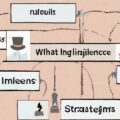Understanding Emotional Intelligence
Emotional intelligence (EQ) is the ability to recognize and manage our own emotions as well as the emotions of others. It’s a crucial skill for building strong relationships, succeeding at work, and living a healthy, fulfilled life. When we have high EQ, we’re better able to connect with people, empathize with them, motivate ourselves, persist through challenges, and regulate our feelings and behaviors.
Why Take an EQ Test?
Taking an emotional intelligence assessment can give you valuable insight into your EQ strengths and weaknesses. Understanding your EQ can help you identify areas where you might need to build skills to reach personal or professional goals. It can also show you where your natural talents lie so you can apply them more. Rather than focusing solely on scoring, use EQ tests as tools for self-reflection and growth.
Choosing an EQ Test
There are many free and paid EQ tests available online and in books. When choosing one, consider what aspects of EQ you want to measure and how you want to use the results. Tests range from quick online quizzes to comprehensive evaluations of subskills that provide personalized suggestions for development.
Here Are 10 Reputable EQ Tests and Scales to Consider
1. Emotional Intelligence Appraisal – Me Edition
The Emotional Intelligence Appraisal developed by TalentSmart tests four components of EQ: self-awareness, self-management, social awareness, and relationship management. The ME Edition is a 28-question self-assessment with tips for improving your EQ skills in different areas.
2. MSCEIT
The Mayer-Salovey-Caruso Emotional Intelligence Test is an ability-based assessment grounded in a four-branch model of EQ. It measures how well you can perceive, understand, manage and use emotions without subjective self-reporting.
3. The Emotional and Social Competency Inventory
The Emotional and Social Competency Inventory uses a 360-degree approach, gathering ratings from you and people who know you across 18 emotional intelligence skills. The results can show how your self-perception compares to others’ views.
4. Bar-On EQ-i 2.0
This emotional intelligence test provides an overall EQ score as well as scores for five main EQ components: self-perception, self-expression, interpersonal skills, decision-making, and stress management. It is one of the most respected and widely used EQ measures.
5. The Enneagram
The Enneagram categorizes people into nine personality types. Discovering your type through online tests or books can offer useful insights on your emotions, relationships, leadership style and areas for growth.
6. Plutchik’s Wheel of Emotions
Plutchik’s wheel can help you evaluate your ability to recognize different emotions in yourself and others. See if you can correctly identify basic, advanced and subtle emotions before exploring why this matters for EQ.
7. Harvard Implicit Association Tests
While not strictly a measure of emotional intelligence, Harvard offers insightful free Implicit Association Tests that reveal unconscious biases and beliefs that may silently influence your feelings and actions without self-awareness.
8. The Wong Law Emotional Intelligence Scale
This free test focuses strictly on emotional intelligence at work across four factors: self-emotional appraisal, others’ emotional appraisal, regulation of emotion and use of emotion. It aims to predict job performance and satisfaction.
9. Trait Emotional Intelligence Questionnaire
The TEIQue provides an overall EQ score plus scores across 15 EQ-related traits, like stress management, optimism, happiness, self-control, empathy and emotion expression. This can give detailed insight into your EQ profile.
10. Emotional Intelligence Quotient Inventory
The EQ-i 2.0 Youth Version is a self-rated assessment tailored for young people ages 7-18. It measures EQ to help identify areas impacting academic achievement, relationships, well-being, and career readiness.
FAQ
What does it mean to have high emotional intelligence?
People with high emotional intelligence are good at identifying their own emotions and the emotions of others. They understand what emotions mean and how they impact thoughts and actions. They also know how to manage their emotions effectively – whether regulating distress or channeling emotions productively to motivate themselves and relate well to people.
Does emotional intelligence matter?
Yes, emotional intelligence plays an extremely important role in everyday life. Having higher EQ leads to better mental health, relationships, career success, stress management, and overall wellbeing. It helps you thrive in both personal and professional spheres by mastering life skills that traditional intellect can’t address.
What are the main components of emotional intelligence?
According to science, these are the core components of emotional intelligence:
- Self-awareness – Recognizing your emotions
- Self-management – Handling feelings constructively
- Social awareness – Sensing others’ emotions
- Relationship management – Interacting effectively
Can you improve your emotional intelligence?
Absolutely. Emotional intelligence consists of learnable abilities rather than innate, fixed traits. With commitment over time, anyone can strengthen specific EQ skills through introspection, mindset shifts and practical strategies. Books, online resources, coaching and counseling can all help.
What does it mean if my emotional intelligence is low?
Lower emotional intelligence simply highlights opportunities for growth – it does not define your worth or capabilities. We all have EQ strengths and weaknesses. If your test scores are lower in areas, that provides helpful information to build the skills needed to prevent struggles and accomplish your goals more powerfully.









